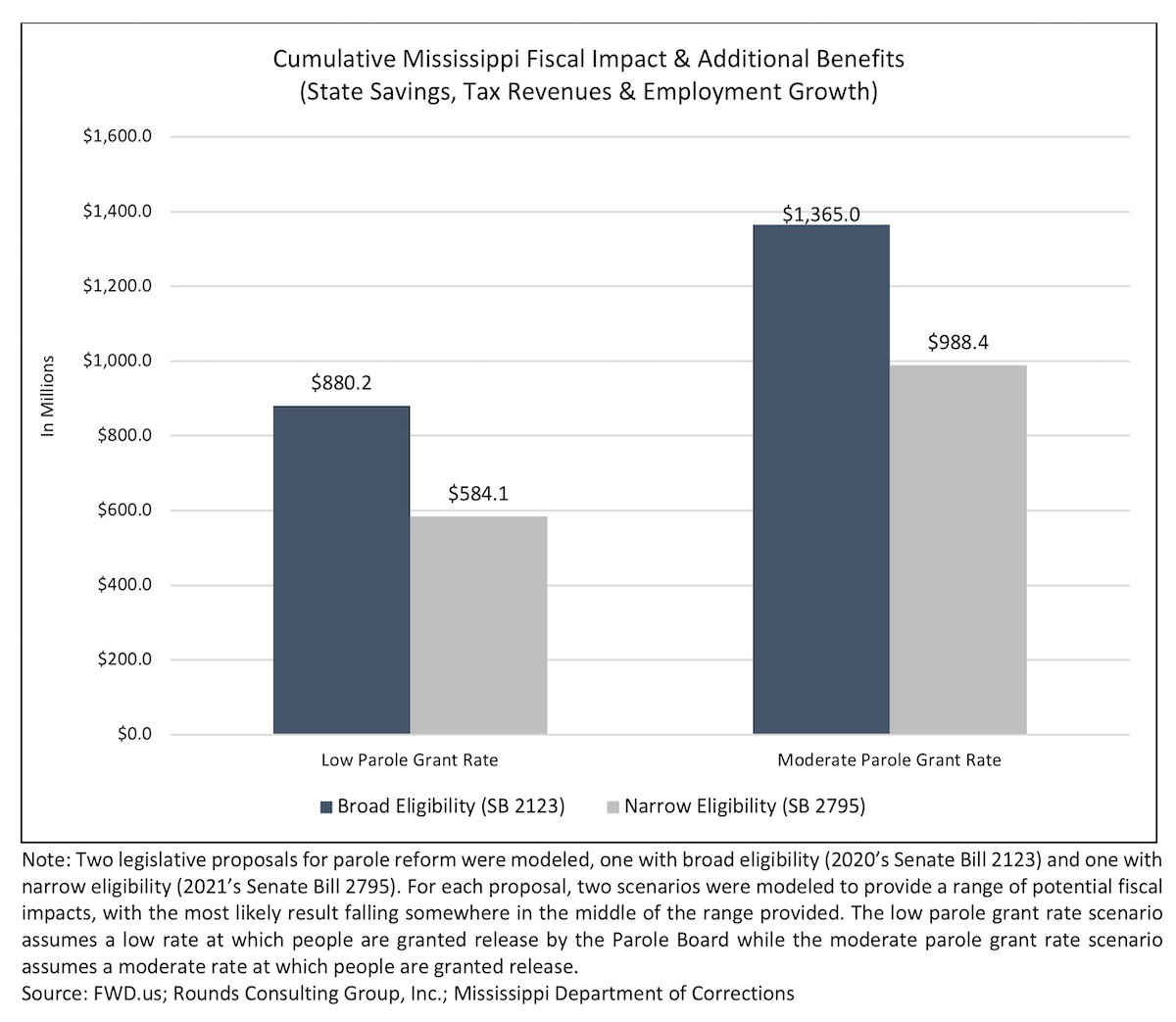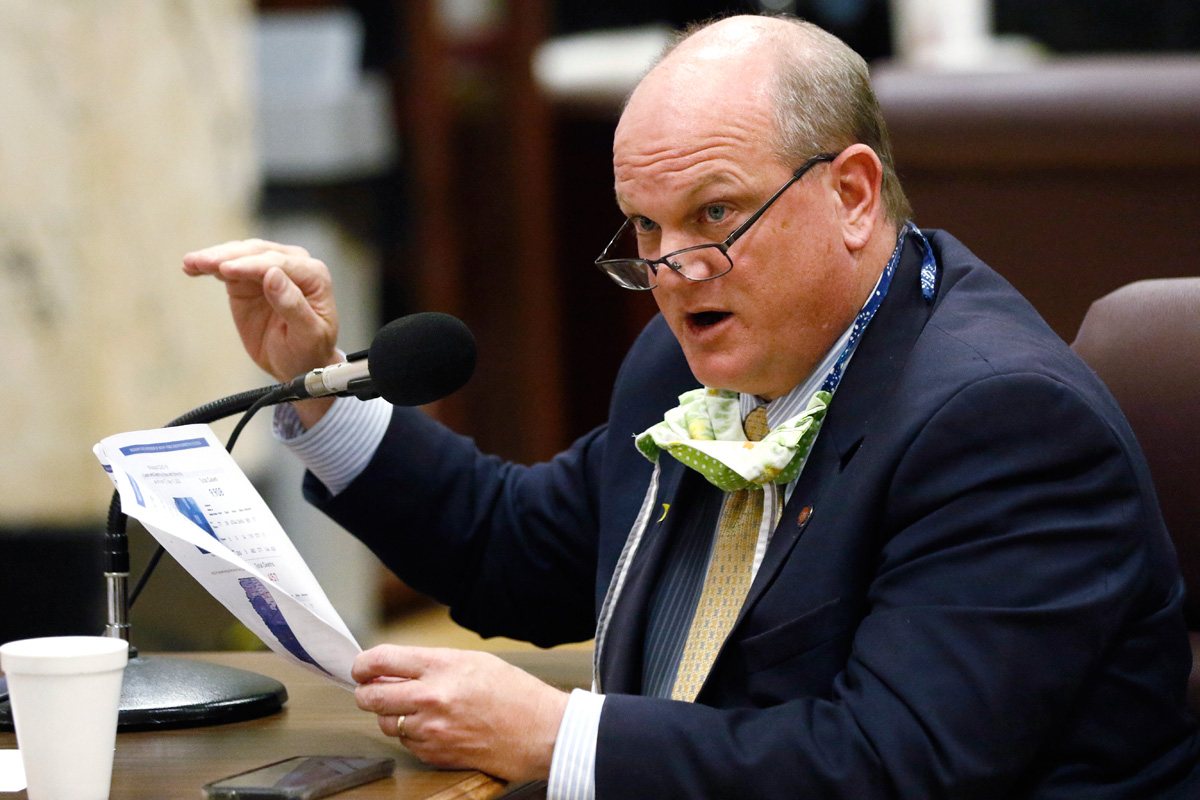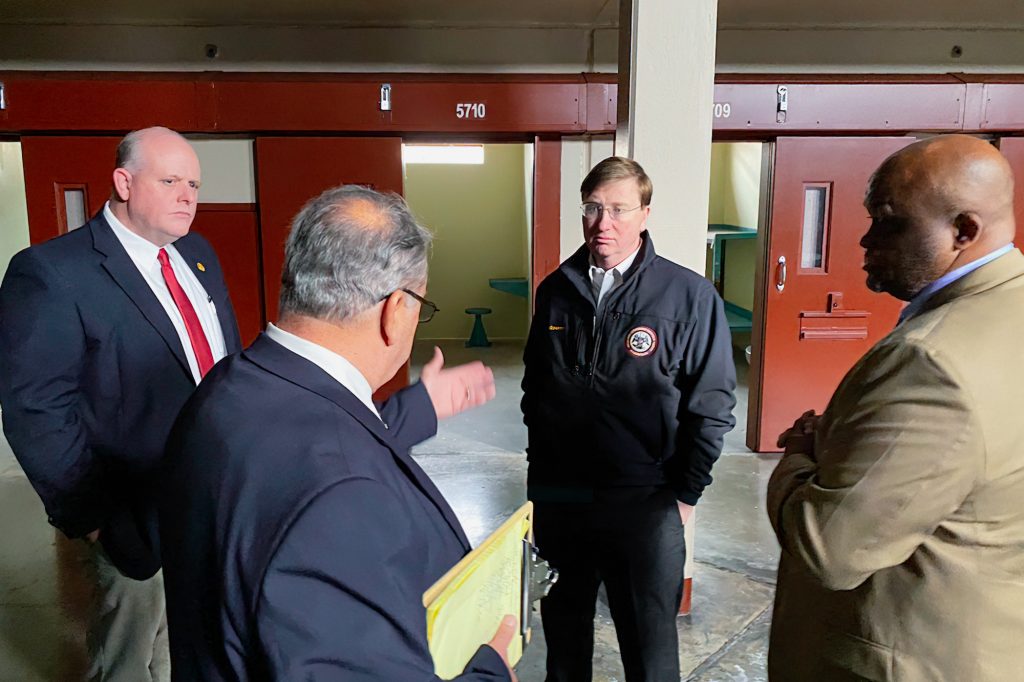When Tameka Drummer celebrates her 47th birthday inside Rankin County’s Central Mississippi Correctional Facility in three days, she will be no closer to leaving prison than she was on her 37th birthday. A judge sentenced her to life in prison without the possibility of parole for felony marijuana possession in 2008—a requirement under Mississippi’s three-strike law; Drummer had already served time for two prior felony convictions.
Legislative deadlines last month killed a bill that would have made parole possible for Drummer and hundreds of inmates like her, but other inmates and families could get a reprieve after Gov. Tate Reeves this afternoon signed a separate criminal justice bill, Senate Bill 2795, making early release possible for thousands of non-habitual offenders.
“Today is a big day for Mississippians across the state, particularly for people and families who sadly, know firsthand just how devastating the state’s incarceration crisis is, and who have, alongside other advocates, pushed to ensure meaningful opportunities for release for their loved ones,” FWD.us Mississippi State Director Alesha Judkins said in a statement on behalf of the pro-criminal justice reform organization today.
‘Smart On Crime And Soft On Taxpayers’
The new law, known as the Mississippi Earned Parole Eligibility Act, loosens Mississippi’s parole requirements, which are currently among the most restrictive in the nation. Large majorities of lawmakers in both of Mississippi’s Republican-dominated chambers approved the changes earlier this year. It will take effect on July 1.

“In a way that we think is common sense, that it is smart on crime and soft on taxpayers. I think the reform is going to really help give an incentive to help people rehabilitate themselves and provide a pathway” to an early release, Empower Mississippi President Russ Latino, whose organization backed the bill, told the Mississippi Free Press this afternoon.
Parole-eligible inmates serving time for non-violent crimes currently must complete at least 25% of their sentence before they can get a parole hearing. But when the new law takes effect this summer, the parole eligibility requirement will change to 25% of the sentence served or a maximum of 10 years. It also allows people convicted of armed robbery to become eligible for a parole hearing after serving 60% of their sentences.
Latino cautioned that the new law’s full impact will not manifest immediately.
“We’re not going to suddenly see a 25% reduction in the prison population. … This is the kind of reform that will take four or five years for us to see the real benefits of. There are thousands of people who will gain parole eligibility who don’t have parole eligibility,” Latino said.
Even after they become eligible, the State Parole Board must approve their release. Its members, who are appointed by the governor and confirmed by the Senate, will decide whether or not to grant parole by assessing factors such as inmate behavior.
The legislation’s primary sponsor, Sen. Juan Barnett, a Heidelberg Democrat, spearheaded the effort to change the parole law with co-sponsors Sen. Robert Jackson, D-Marks; Daniel Sparks, R-Cleveland; Albert Butler, D-Port Gibson; Brice Wiggins, R-Pascagoula; Sampson Jackson II, D-Preston; and Sarita Simmons, D-Jackson.
‘Too Many Incarcerated Mississippians Were Left Out’
After both houses of the Mississippi Legislature approved the Mississippi Earned Parole Eligibility Act earlier this month, FWD.us sounded a bittersweet note as it celebrated the bill’s passage.
“S.B. 2795 came too late to save the dozens of people who were not eligible for parole and died in prison since legislators started working on these reforms. We are also devastated that, for the second year in a row, legislators failed to pass reforms to the state’s harmful habitual sentencing laws,” the organization said in an April 1 statement. “After securing majority support on multiple votes in the House and Senate, House Bill 796 died today before it could come up for a final vote.
“Inaction on habitual laws mean that individuals like Tameka Drummer, who is serving a habitual life sentence for marijuana possession, and Paul Houser, who is serving a 60-year habitual sentence for a drug conviction, remain indefensibly behind bars. Too many incarcerated Mississippians were left out of this year’s criminal justice reform package and must be prioritized in future ones.”
House Bill 796 would have ended the practice of sentencing people with prior violent felonies to life in prison without parole on the basis of a non-violent third felony—the exact scenario that resulted in Drummer’s sentence.

“With the legislative maelstrom, you have to make decisions about what is going to move and what is possible in a given legislative session, and I think there was more appetite to take up parole reform as a priority this year as opposed to the habitual reform issue,” Latino told the Mississippi Free Press.
After petitioners urged Reeves to grant Drummer a pardon last year, the governor said he did not plan to do so at the time.
“I don’t know all the facts of the case, but I am not considering pardoning her or anyone else at this time,” the Associated Press reported him saying.
Latino said there are about 90 inmates in Mississippi who, like Drummer, are serving life-without-parole because of a third non-violent felony following earlier violent ones. He pointed to James Vardaman, a man who was sentenced to life-without-parole in 2005 after being charged with possession of illegal drugs with intent to manufacture.
“There’s very little doubt that he had an addiction problem, but the end result of it is that he gets put in prison for the rest of his life,” Latino said.
Other inmates, like Gregory Hollins, are serving long sentences without parole because of multiple non-violent offenses. Since 2010, Hollins has been serving a 60-year sentence due to drug offenses. Under current law, prosecutors were able to multiply his sentence due to prior convictions.
“He gets 60 years, and I’ll be 90 years old. I might not even be here. His whole family could possibly be gone when he gets out of jail,” Hollins’ brother, Larry, told FWD.us.
Early Releases Could Save Mississippi Nearly $1 Billion
Mississippi implemented the restrictive parole eligibility requirements and its habitual offender law in the 1990s as a “tough-on-crime” wave swept the nation, including the federal government. Then-Sen. Joe Biden authored and then-President Bill Clinton signed the 1994 crime bill, creating harsh sentencing requirements (both men have since called for reversing those policies). The federal bill received cross-partisan support at the time from, including from then-House Rep. Bernie Sanders, a Vermont independent.
Mississippi’s U.S. House delegation, which was made up of five Democrats at the time, split on the 1994 bill, with two members voting for it and three against. Rep. Bennie Thompson, the only remaining member from that period as well as the state’s only current Black or Democratic member of Congress, voted for it. Mississippi’s two U.S. senators at the time, Republicans Trent Lott and Thad Cochran, also voted for it.
Mississippi, like states across the country, followed the national trend with its own “tough-on-crime” reforms in 1995.
“Essentially, the federal government gave financial incentives for states to implement stricter sentencing requirements around ‘Three-strikes, you’re out,’ and to limit parole eligibility,” Latino told the Mississippi Free Press today.
Mississippi jails and prisons held 8,158 inmates in 1990. After the mid-decade changes, though, the state’s inmate population skyrocketed—even as the state’s overall population stagnated. By 2000, more than 18,000 Mississippians lived behind bars. Despite some middling criminal justice reforms in recent years, the Mississippi Department of Corrections reported that 17,229 inmates live in all the state’s jails and prisons as of April 2021.
Last month, FWD.us, a criminal-justice reform organization, released a study with Rounds Consulting Group on the fiscal impact of loosening parole eligibility requirements. The study found that the Mississippi Earned Parole Eligibility Act will save at least $584 million with a “low parole grant rate” or as much as $988 million over a 30-year-period with a “moderate parole grant rate.”

“In signing this bill, Gov. Reeves is helping to address the overcrowding problems created by the Clinton-Biden Crime Bill in the mid-1990s. It should be seen as a signal to the Department of Justice that we are prepared to get our own house in order, without costly federal intervention,” Latino, Empower Mississippi’s president, said in his statement this afternoon. “This is a smart on crime, soft on taxpayer conservative reform.”
“Among those who deserve immense credit in this process are Reps. Nick Bain and Kevin Horan, Sens. Juan Barnett, Brice Wiggins and Daniel Sparks, as well as Lt. Gov. Delbert Hosemann and Speaker Philip Gunn. Without their combined efforts, the bill would not have become law.”
A more expansive version of parole eligibility reform that the Legislature could have chosen instead, Senate Bill 2123, would have saved the state as much as $1.37 billion, the group said. But lawmakers opted for the narrower reforms this year after Gov. Reeves vetoed a more expansive parole reform bill last year. Explaining his 2020 veto at the time, the governor said he feared it would allow violent offenders to get an early release. The new law does not expand eligibility options for violent crimes like murder or sexual assault.
‘Just One Important Step’
Today, Latino said, his organization is celebrating the parole eligibility changes, which he emphasized is a major step that should offer Mississippians hope. After this victory, he said, Empower Mississippi will soon begin engaging in renewed talks with lawmakers about additional reforms.
Along with looking at changes to the state’s habitual offender laws, he said, the organization is studying accomplishments in New Jersey and Texas to find solutions to boost re-entry and reduce recidivism rates in the Magnolia State.
FWD.us agreed that there is much more work to do.
“This is just one important step,” Judkins said in today’s FWD.us statement today. “We stand ready to continue working with legislators and state leadership on more common sense solutions, like changing the state’s harsh habitual sentencing laws, further safely reducing Mississippi’s prison population, and strengthening families and communities across our state.”

In a tweet thread explaining his decision to sign the Mississippi Earned Parole Eligibility Act into law today, Gov. Reeves suggested he may not support future efforts if they include relaxing habitual offender laws. Second chances are “good,” he wrote, but “knee-jerk” efforts “can harm public safety.”
“This bill expands parole eligiblity for some—but it does not guarantee it! And not all are eligibile—we were able to ensure 1st and 2nd degree murderers can’t get it. … And no one gets out JUST because they are older. Maybe best of all, habitual offenders are not included in this bill,” he wrote. “I trust my Parole Board appointees to make wise decisions. S.B. 2795 was not an easy call for me. But, at the end of the day, I believe it meets my standard for a measured approach, & with proper implementation, it can be a net positive for Mississippi.”
Sen. Wiggins, one of the legislation’s sponsors, thanked the governor in a tweet today. “Good policy takes time and at times a 2nd look. The #msleg addressed ur issue and sent you a bill you could sign,” he wrote.
The hopeful news for criminal-justice reforms came hours after the U.S. Supreme Court, in an opinion authored by Justice Brett Kavanaugh, dealt a blow to some advocates with its ruling in Jones v. Mississippi by declining to reverse a life-without-parole sentence for a Mississippi inmate who was convicted at age 15.
Latino did not address the ruling specifically, but said he believes Mississippi will need to make changes to the way it handles juvenile justice issues moving forward in order to avoid federal intervention.
The Empower Mississippi president said he thinks today’s parole-eligibility reform could also forestall intervention related to an ongoing U.S. Department of Justice investigation into Mississippi’s overcrowded prison system. More than Mississippi 100 inmates died last year amid outbreaks of violence and COVID-19.
“I think this sends a signal to the Department of Justice that we’re taking these problems seriously both administratively and through policy,” Latino said this afternoon.
Correction: An earlier version of this story said that a FWD.us study found that Mississippi “will save at least $584 million with a ‘low parole grant rate’ or as much as $988 million a year with a ‘moderate parole grant rate'” by adopting the parole eligibility reform. The estimate refers to a 30-year period, not a single year. We apologize for this error.










